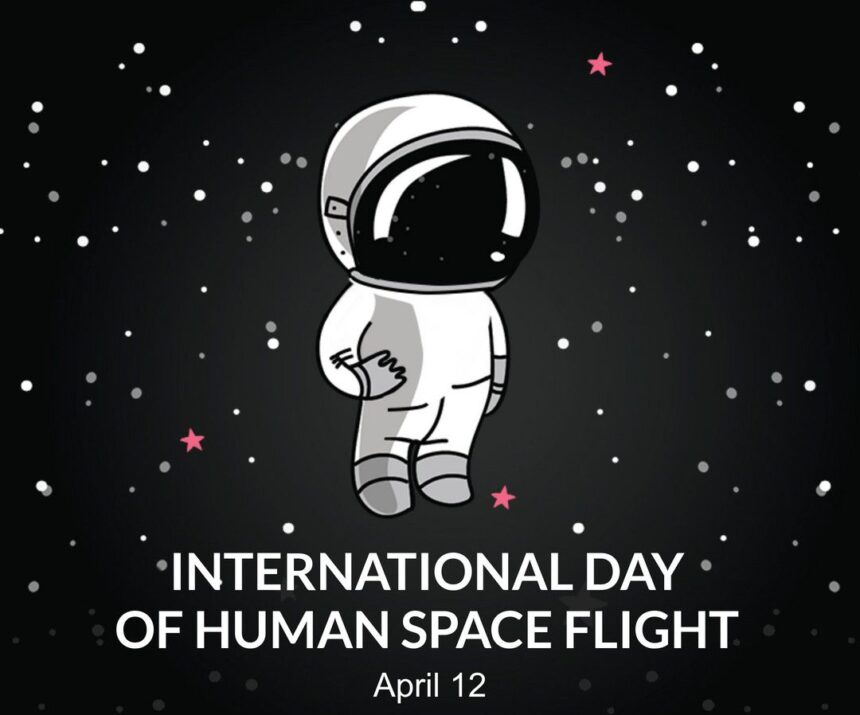🚀 7 Groundbreaking Reasons Why International Day of Human Space Flight is a Proud Milestone
📅 Celebrated on: April 12
🌍 Declared by: United Nations General Assembly
🌌 Purpose: To honor the beginning of human space exploration and highlight its impact on humanity and science.
🌠 Introduction: One Giant Leap for Mankind
Every year on April 12, the world celebrates the International Day of Human Space Flight—a moment that marked the turning point in human history when we first broke free from Earth’s gravitational bonds. On this day in 1961, Yuri Gagarin, a Soviet cosmonaut, became the first human to journey into outer space, orbiting the Earth aboard Vostok 1.
- 📅 Celebrated on: April 12
- 🌍 Declared by: United Nations General Assembly
- 🌌 Purpose: To honor the beginning of human space exploration and highlight its impact on humanity and science.
- 🌠 Introduction: One Giant Leap for Mankind
- 📚 History of the International Day of Human Space Flight
- 📅 Timeline of Human Space Flight
- 🌌 10 Fascinating Facts About Human Space Flight
- 🌍 Significance of International Day of Human Space Flight
- 1. 🚀 Scientific Innovation
- 2. 🌏 Unity Beyond Borders
- 3. 🧠 Inspiring Curiosity and STEM Education
- 4. 🌌 Understanding the Universe
- 5. 🛡️ Earth Defense
- 🙋 FAQs: Frequently Asked Questions
- ❓ Who was the first human in space?
- ❓ Why do we celebrate this day?
- ❓ What is the International Space Station (ISS)?
- ❓ How long do astronauts stay in space?
- ❓ Can civilians go to space?
- 🌐 Global Observance
- 🏫 Educational Events
- 🛰️ Online Celebrations
- 🧑🚀 Museum and Science Center Activities
- 📱 Social Media Campaigns
- 🎉 Wishing Messages for Human Space Flight Day
- 🔑 Important Observations and Takeaways
- 💡 Daily Life Impact of Space Exploration
- 🧠 Why It Matters in Today’s World
- 🔚 Conclusion: A Day to Remember, Reflect, and Reach Higher
This wasn’t just a win for the Soviet Union—it was a symbolic moment for all humanity. It showed that with enough courage, innovation, and unity, humans could venture into the unknown. Today, this day serves not only as a celebration of past achievements but also a call to dream bigger, explore deeper, and unite further.
📚 History of the International Day of Human Space Flight
The United Nations General Assembly officially proclaimed April 12 as the International Day of Human Space Flight in 2011, to commemorate the 50th anniversary of Yuri Gagarin’s historic flight.
But the space race started much earlier:
In the 1950s, the Cold War rivalry between the USSR and the USA pushed both nations to dominate space.
In 1957, the USSR launched Sputnik 1, the first artificial satellite.
In 1961, Yuri Gagarin became the first human in space.
In 1969, the USA landed Neil Armstrong and Buzz Aldrin on the Moon during the Apollo 11 mission.
This international day is meant to celebrate peaceful exploration and honor humanity’s collective potential to go beyond earthly boundaries.
📅 Timeline of Human Space Flight
| Year | Event |
|---|---|
| 1957 | Sputnik 1 becomes the first artificial satellite |
| 1961 | Yuri Gagarin becomes the first human in space |
| 1963 | Valentina Tereshkova becomes first woman in space |
| 1969 | Apollo 11 puts the first humans on the Moon |
| 2000 | ISS becomes permanently inhabited |
| 2004 | First private spaceflight by SpaceShipOne |
| 2011 | UN declares April 12 as International Day of Human Space Flight |
| 2021 | 60th anniversary of human spaceflight |
| 2023 | Civilian astronauts and space tourism missions increase |
🌌 10 Fascinating Facts About Human Space Flight
Yuri Gagarin’s flight lasted only 108 minutes.
He was only 27 years old when he made history.
Valentina Tereshkova, the first woman in space, flew just two years later in 1963.
The International Space Station (ISS) has hosted people from over 19 countries.
The ISS orbits the Earth every 90 minutes.
Space travel affects human bone density and muscle mass.
Reusable rockets like those by SpaceX have drastically reduced space travel costs.
The Moon is about 384,000 km away from Earth.
Scientists are currently working on sending humans to Mars.
Space tourism is now a reality, with civilians traveling beyond Earth’s orbit.
🌍 Significance of International Day of Human Space Flight
The day holds profound importance in various domains:
1. 🚀 Scientific Innovation
Human space flight has led to innovations in communication, health, weather prediction, and materials science. From GPS systems to MRI machines—many technologies owe their existence to space research.
2. 🌏 Unity Beyond Borders
Space exploration is a rare example of international cooperation. The ISS is jointly operated by NASA (USA), Roscosmos (Russia), ESA (Europe), JAXA (Japan), and CSA (Canada).
3. 🧠 Inspiring Curiosity and STEM Education
It fuels interest in science, technology, engineering, and mathematics (STEM) among students globally.
4. 🌌 Understanding the Universe
Studying space helps us understand planetary systems, black holes, cosmic radiation, and even Earth’s own climate.
5. 🛡️ Earth Defense
Space research helps us track asteroids, comets, and solar storms that might threaten life on Earth.
🙋 FAQs: Frequently Asked Questions
❓ Who was the first human in space?
Yuri Gagarin, a Soviet cosmonaut, was the first person in space, on April 12, 1961.
❓ Why do we celebrate this day?
To honor the beginning of human space exploration and recognize its contributions to science, unity, and peace.
❓ What is the International Space Station (ISS)?
It is a habitable artificial satellite and science lab that orbits Earth, where astronauts live and work.
❓ How long do astronauts stay in space?
Typically 6 months, though some have stayed over a year.
❓ Can civilians go to space?
Yes! With advancements in space tourism, civilians have started traveling to low Earth orbit.
🌐 Global Observance
Countries across the world observe the day through:
🏫 Educational Events
Space quizzes, rocket-building competitions, and astronaut-themed exhibitions.
🛰️ Online Celebrations
Virtual planetarium visits, webinars with astronauts, and science talks.
🧑🚀 Museum and Science Center Activities
Special showcases at space museums and science centers like NASA, ISRO, and ESA.
📱 Social Media Campaigns
Hashtags like #HumanSpaceFlightDay and #YuriGagarin trend globally.
🎉 Wishing Messages for Human Space Flight Day
🌌 “Let us dream beyond borders. Happy International Day of Human Space Flight!”
🚀 “Here’s to the heroes who dared the stars and inspired the Earth!”
🌍 “Wishing a day of cosmic pride, limitless dreams, and unity in discovery!”
🌠 “Humanity’s journey into space began with one man, one orbit, and one dream. Celebrate it today!”
🛰️ “From Earth to the stars, may our curiosity never rest!”
🔑 Important Observations and Takeaways
April 12 commemorates Yuri Gagarin’s journey, the first human to orbit Earth.
Recognized internationally to promote scientific cooperation and peace.
Encourages youth to pursue STEM education and innovation.
Highlights the value of space research in daily life and global safety.
Symbolizes human courage, potential, and our shared destiny beyond Earth.
💡 Daily Life Impact of Space Exploration
Many benefits of space flight quietly influence our daily lives:
| Field | Example of Impact |
|---|---|
| Communication | Satellites for TV, mobile phones, internet |
| Healthcare | MRI, robotic surgery, water purification |
| Transportation | GPS, fuel-efficient designs |
| Disaster Management | Satellite data for floods, cyclones, forest fires |
| Agriculture | Climate prediction and soil observation satellites |
🧠 Why It Matters in Today’s World
In a time of climate change, war, misinformation, and division—space remains a hopeful frontier that unites us as one species. Every space mission is not just about rockets; it’s about resilience, cooperation, knowledge, and progress.
Space exploration teaches us humility and awe. It reminds us of our place in the cosmos. And most importantly—it reveals how precious and fragile our Earth really is.
🔚 Conclusion: A Day to Remember, Reflect, and Reach Higher
The International Day of Human Space Flight is more than a day in history. It’s a legacy of courage. It’s a reminder of what’s possible when nations work together. And it’s a vision for the future, where our children may look up at the stars—not with wonder alone, but with purpose and possibility.
So whether you’re a scientist, student, dreamer, or citizen—take a moment on April 12 to gaze up at the sky and remember: We’ve been there. And we’re going farther.








